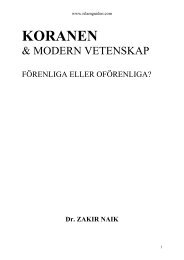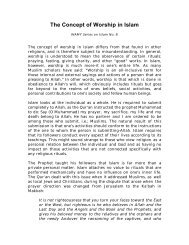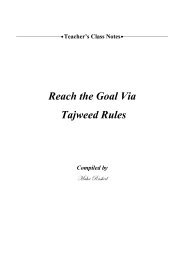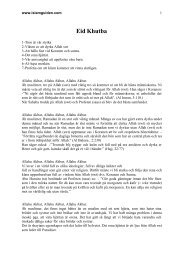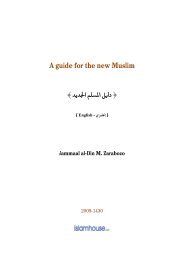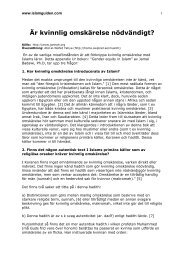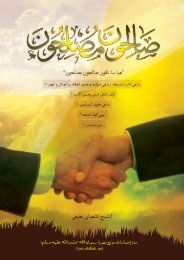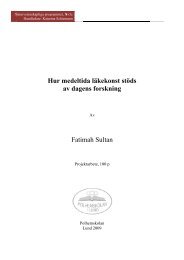The Prophet's Prayer From The beginning To The End As Though ...
The Prophet's Prayer From The beginning To The End As Though ...
The Prophet's Prayer From The beginning To The End As Though ...
You also want an ePaper? Increase the reach of your titles
YUMPU automatically turns print PDFs into web optimized ePapers that Google loves.
I say: <strong>The</strong> best that I have found in answer to this is what Haafiz Ibn Katheer has mentioned in his<br />
Sharh Ikhtisaar 'Uloom al-Hadeeth (p.31), that Imaam Maalik said, "Indeed the people have come<br />
together on, and know of, things which we are not acquainted with." This was part of the excellence<br />
of his wisdom and impartiality, as Ibn Katheer (rahimahullaah) says.<br />
Hence, it is proved that all differing is bad, not a mercy! However, one type of differing is<br />
reprehensible, such as that of staunch followers of the Madhhabs, while another type is not<br />
blameworthy, such as the differing of the Companions and the Imaams who succeeded them - May<br />
Allaah raise us in their company, and give us the capability to tread their path.<br />
<strong>The</strong>refore, it is clear that the differing of the Companions was not like that of the muqallideen.<br />
Briefly: the Companions only differed when it was inevitable, but they used to hate disputes, and<br />
would avoid them whenever possible; as for the muqallideen, even though it is possible in a great<br />
many cases to avoid differing, they do not agree nor strive towards unity; in fact, they uphold<br />
differing. Hence there is an enormous gulf between these two types of people in their difference of<br />
opinion.<br />
This was from the point of view of cause.<br />
B) <strong>The</strong> difference in effect is more obvious.<br />
<strong>The</strong> Companions (radi Allaahu 'anhum), despite their well- known differing in non-fundamental<br />
issues, were extremely careful to preserve outward unity, staying well-away from anything which<br />
would divide them and split their ranks. For example, there were among them those who approved<br />
of saying the basmalah loudly (in prayer) and those who did not; there were those who held that<br />
raising the hands (in prayer) was recommended and those who did not; there were those who held<br />
that touching a woman nullified ablution, and those who did not; - but despite all that, they would<br />
all pray together behind one imaam, and none of them would disdain from praying behind an<br />
imaam due to difference of opinion.<br />
<strong>As</strong> for the muqallideen, their differing is totally opposite, for it has caused Muslims to be divided<br />
inthe mightiest pillar of faith after the two testifications of faith: none other than the Salaah (<strong>Prayer</strong>).<br />
<strong>The</strong>y refuse to pray together behind one imaam, arguing that the imaam's prayer is invalid, or at<br />
least detestable, for someone of a different Madhhab. This we have heard and seen, as others beside<br />
us have seen 12 ; how can it not be, when nowadays some famous books of the Madhhabs rule such<br />
cases of invalidity or detestability. <strong>The</strong> result of this has been that you find four Mihraabs (alcoves) in<br />
some large congregational mosques, in which four imaams successively lead the <strong>Prayer</strong>, and you<br />
find people waiting for their imaam while another imaam is already standing in <strong>Prayer</strong>!!!<br />
In fact, to some muqallideen, the difference between the Madhhabs has reached a worse state than<br />
that, such as a ban in marriage between Hanafees and Shaafi'is; one well known Hanafi scholar, later<br />
nicknamed Mufti ath-Thaqalayn (<strong>The</strong> Mufti for Humans and Jinn), issued a fatwaa allowing a Hanafi<br />
man to marry a Shaafi'i woman, because "her position is like that of the People of the Book" 13 ! This<br />
implies - and implied meanings are acceptable to them - that the reverse case is not allowed, i.e. a<br />
Hanafi woman marrying a Shaafi'i man, just as a Muslim woman cannot marry a Jew or Christian!!<br />
<strong>The</strong>se two examples, out of many, are enough to illustrate to anyone intelligent the evil effects of the<br />
differing of the later generations and their insistence upon it, unlike the differing of the earlier<br />
generations (the Salaf), which did not have any adverse effect on the Ummah. Because of this, the<br />
latter are exempt from the verses prohibiting division in the Deen, unlike the later generations. May<br />
Allaah guide us all to the Straight Path.<br />
١٤



